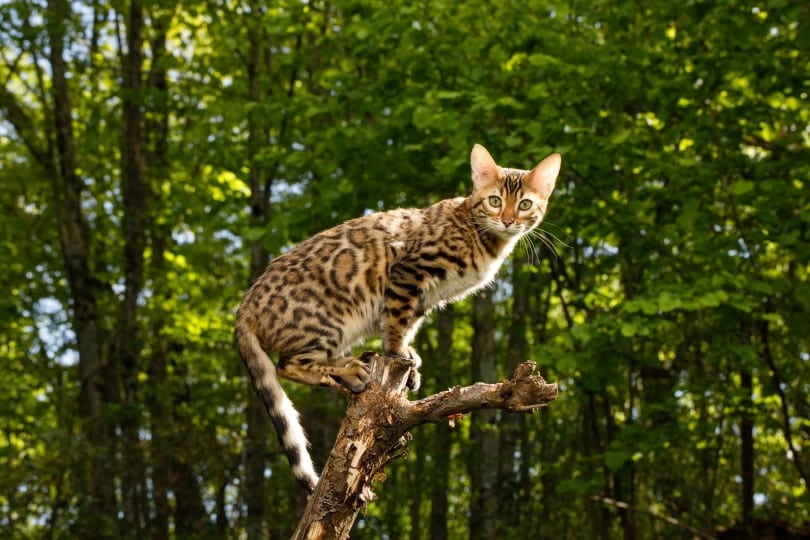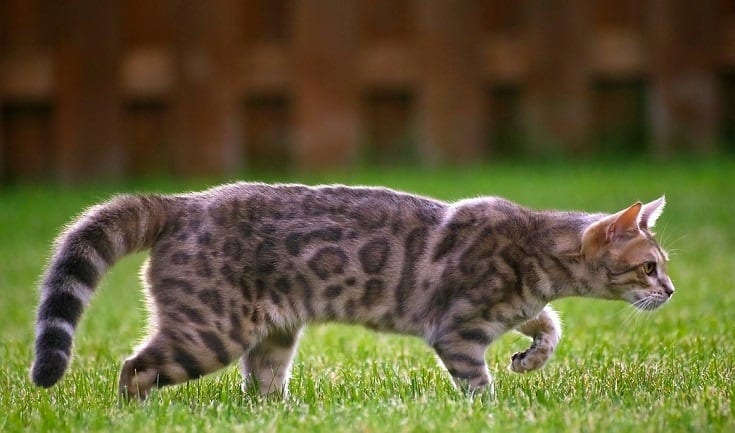Click to Skip Ahead
Bengal cats are hybrid crosses of wildcats and domesticated cat breeds, so you might expect them to be significantly larger than their fully domestic peers. Although Bengal cats are often a little larger than average, if you’re expecting your kitten to look like a bobcat someday, you’ll probably be surprised. These cats range from medium to large, but they aren’t as large as some other domesticated cat breeds. However, their lean, muscular bodies and high energy levels might make them seem more powerful than their size suggests.

Asian Leopard Cat Size
The Bengal’s “wild” hybridization comes from the Asian Leopard cat, a small wild cat native to Southeast Asia. These beautiful spotted cats are generally about the same size as domestic cats. However, their size varies considerably – those found in tropical areas weigh anywhere from 1.2 – 8.4 lbs (0.55 – 3.8 kg), whereas those in northern China and Siberia can reach weights of up to 16 lbs (7.1 kg). In addition, they are built slightly differently than domestic cats, with longer legs and tails that give them a tall, elegant appearance.
Bengal Cat Size Range
Bengal cats follow their domestic parents, ending up with a similar size range to most domestic cats. Your average Bengal cat will weigh about 15 pounds (7 kg), depending on the individual cat. They are also around 8–10 inches tall (shoulder height). Male cats tend to be slightly larger than female cats, but there are lots of other things that can affect your cat’s size, namely their lineage and generational number, and are typically not exceptionally large.

Factors Determining Size
Although hybrids like Bengals have some traits that set them apart, they actually don’t have a lot of “wild” outcrossing. Most Bengals have about the equivalent of a wild ancestor for a great-great or three greats grandma! This is usually due to legal requirements for the breed. For example, in most countries, only individuals of generations G5 onwards are considered legal. That means that the overwhelming majority of Bengals that are pets are considered domestic.
The breeds used to cross with your Bengal’s wild ancestors are the biggest factor in determining size. Some lines were bred with cats that already had spotted coat patterns, like the Egyptian Mau. Others looked for cats with graceful lines, like the Bombay. And finally, some breeders just crossed cats with whatever was locally available—usually British or American Shorthairs. That diverse original gene pool means that there’s a lot of variety in size. If your cat’s ancestry mostly comes from a smaller breed, they’ll tend to be smaller. Today, most Bengals worldwide are bred with other Bengals, averaging out the gene pool, but you’ll still see a big variation in size from cat to cat.

Final Thoughts
Bengal cats are fully mature in about two years, so you can expect your cat to be at a final weight and height around then. However, the rate of growth slows over time. That means that your cat will likely be more than half of their final weight by 12 months old and only gain a couple of pounds in his last year. You can usually get a good idea of your Bengal’s final size by the time they reach a year old but remember that they are still maturing.
Featured Image Credit: skeeze, Pixabay










